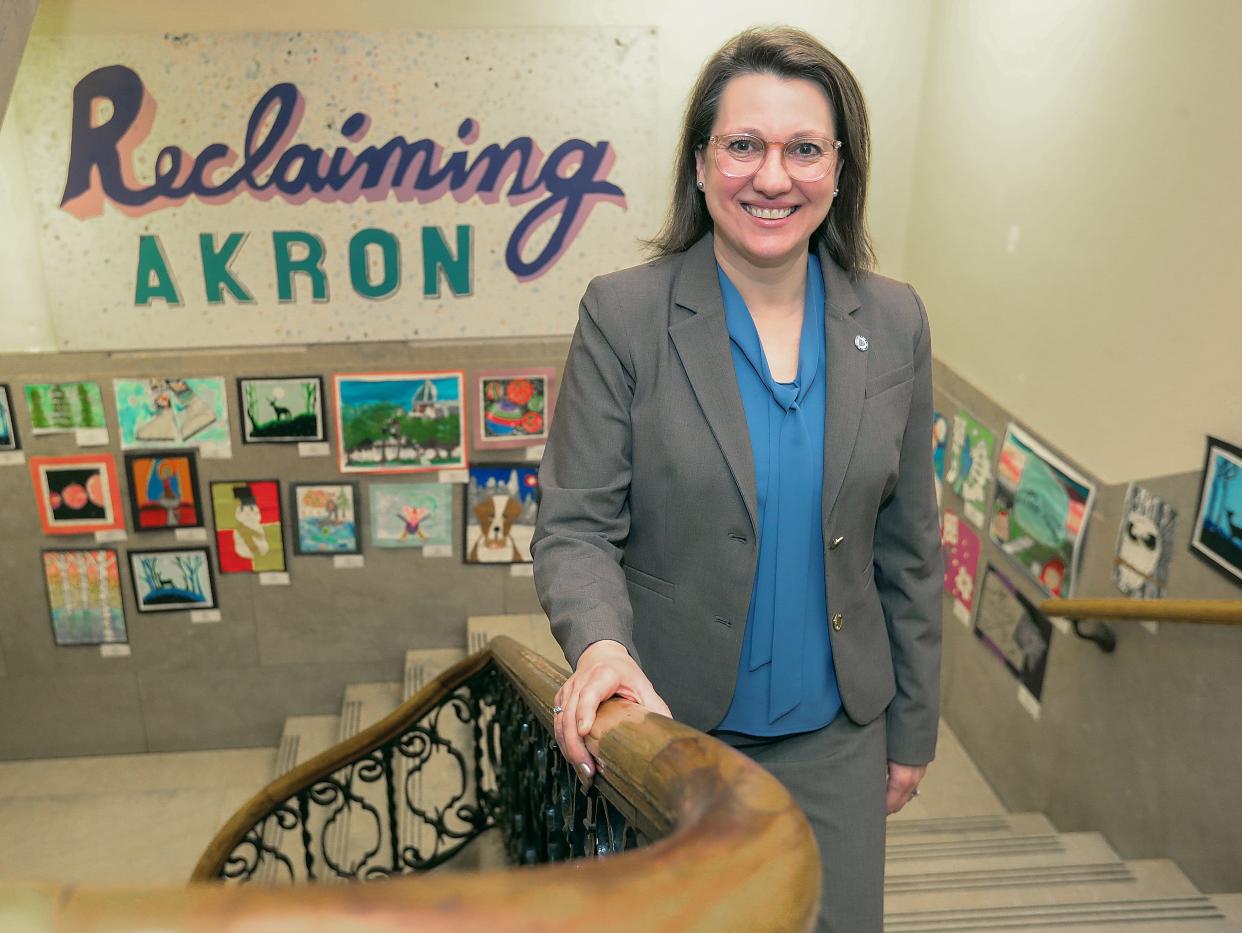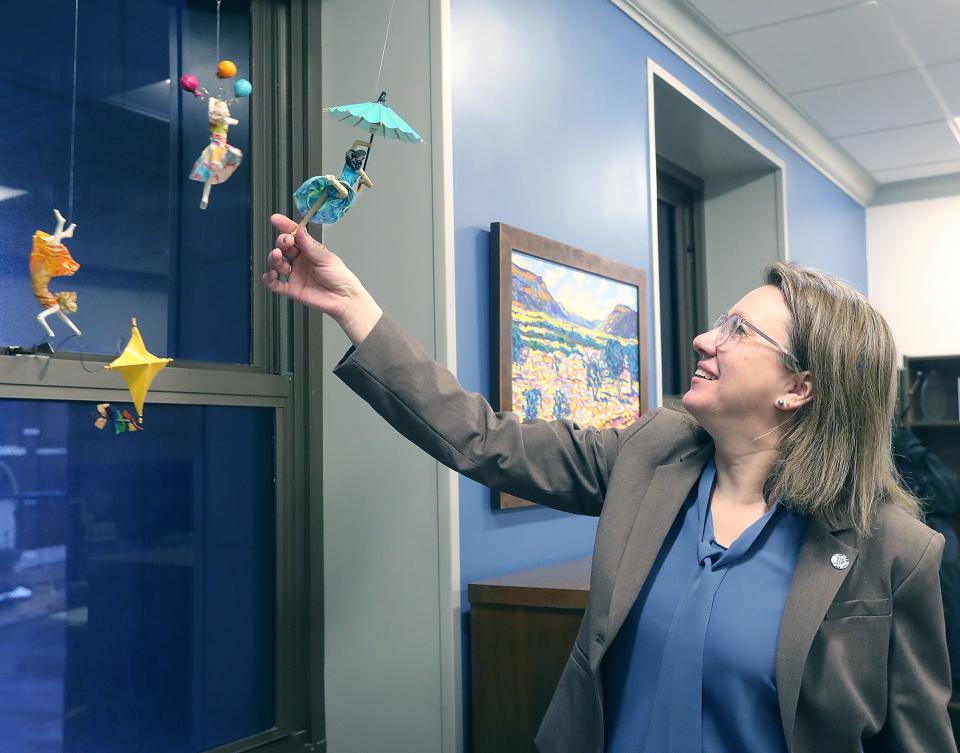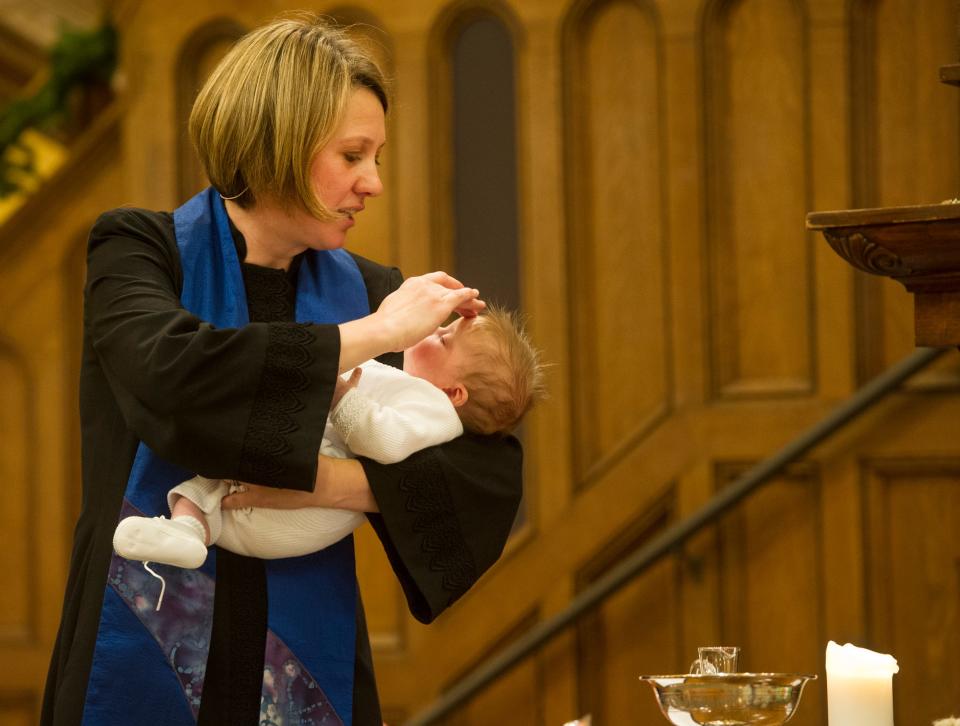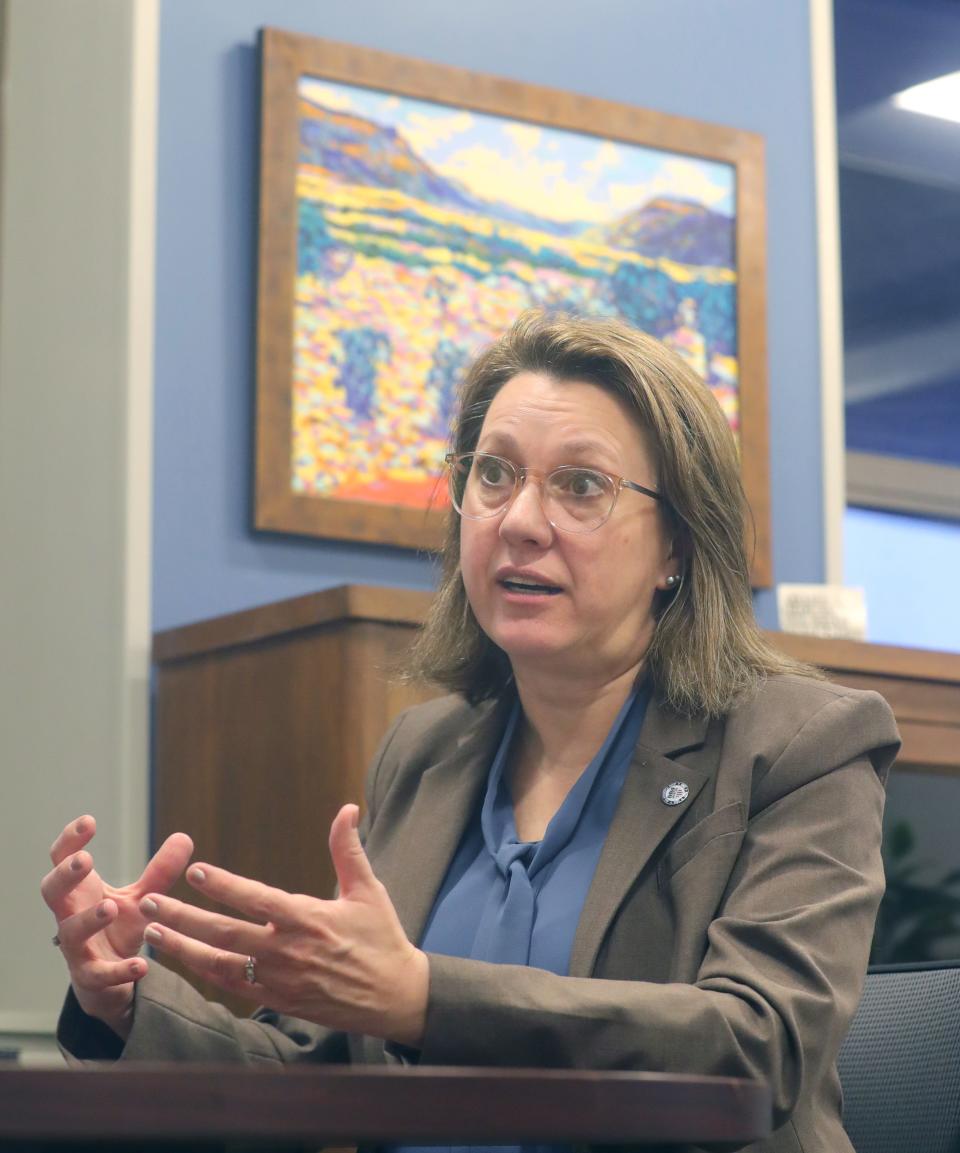Molded by apartheid and faith, Chief of Strategy Nanette Pitt brings unique view to City Hall

- Oops!Something went wrong.Please try again later.
Nanette Pitt was born in 1973 in South Africa while the country was still gripped by apartheid — a racist ruling system dominated by the country's white minority population.
She grew up watching the country shift to a burgeoning democracy, casting her first vote in the white-only referendum that ended apartheid.
At 28, Pitt and her husband, Steven Savides, left for America. Savides was bound for a stateside journalism gig with Boston's Christian Science Monitor; Pitt was winging it.
She left a career in theater for ordained ministry, and in Akron, she became senior minister at First Congregational.
Now, 23 years after leaving South Africa, Pitt is a key member of Akron Mayor Shammas Malik's administration in a newly created chief of strategy role.
Her job, she said, is to make Malik's campaign promises a reality.
Molded by her experiences in South Africa and her faith, Pitt approaches the job with a keen understanding of the fragility of democracy and the respect due to all people.
Nanette Pitt recognizes evils of racism at young age in South Africa
Growing up in apartheid-era South Africa with a natural curiosity attuned Pitt to power imbalances. She remembers asking her mother why all the employees at the grocery store were Black, while all the shoppers white.
"Something seemed wrong," she said. "Something seemed off."
Her hometown of Port Elizabeth was strikingly similar to Akron in that both were significant to the rubber industry. Goodyear, Firestone and Volkswagen all had facilities there.
"There was a big manufacturing industry, and so I grew up around a carbon black factory in the city," Pitt said.
She was raised by a single working mother — employed at Firestone as a graphic designer for a time — who wasn't extremely politically active but did challenge the status quo, going so far as to smuggle someone across the border in the trunk of her car to circumvent the government's control of people's movements.
"People who needed to move around for reasons that were political or to subvert that system, they would have to move in ways that were clandestine," Pitt said.
Though Pitt experienced considerable privilege because of her whiteness — access to a good education, for example — chauvinistic attitudes the country harbored about women countered that privilege. Compounding things was her stepfather's alcoholism.
"South Africa was a place of great contrasts and a place of great contradiction," Pitt said.

Despite the state's intentional efforts to blind its citizens, the imbalances were clear.
People twisted themselves into knots justifying it, she said, using religious, biological and socioeconomic excuses.
"Ultimately, there was no defense for the kind of racism that was sponsored by the state," Pitt said.
On March 17, 1992, Pitt voted in the referendum put exclusively to white voters about whether to end apartheid. They chose to terminate a system created in 1948 by gerrymandering.
Two years later, the country held its first democratic elections.
But even with apartheid being dismantled, the air was, as before, thick with contradictions.
People felt the joy of having done away with an oppressive system, but there was also the flip side —worry that there wouldn't be a peaceful power transition, she recalled.
"We also did the Truth and Reconciliation Commission, which was not gleeful or heady in any way," said Pitt. "It was a very, very difficult process. But I think that that brought with that joy, and that heaviness, a sense of reality, and a sense of honoring the past, and the pain, and the hurt and the harm that the past had caused."
The journey to America leads to leap of faith
In January of 2000, Pitt met Steven Savides, a journalist who moved to Port Elizabeth to work as the business editor on the local daily paper and the local weekend paper.
They hit it off and were soon married, heading to America.
"It was a wonderful whirlwind romance," Savides said. From the moment he met her, he said he was attracted to her inner and outer beauty, and her intelligence.
Savides was talking with Boston's Christian Science Monitor about a job as its African correspondent. The plan, said Pitt, was that the Monitor would train him, and they would return to South Africa. They never intended to be immigrants.
By then, the print media landscape was shifting, and with it, the Monitor's priorities. The paper's new managing editor decided not to send Savides back to Africa. He was working on the international desk on Sept. 11, 2001, an event that he said played a part in shaping their identities in their new home.
The first few years were rough.
Luckily, they found a couple who were able to facilitate them staying in the country. Pitt earned a master's degree in divinity at Connecticut's Andover Newton Seminary, the oldest seminary in America.
There was naturally some culture shock upon arriving in America, but some things felt familiar — America's racial segregation and the excuses made for it, for one.
Pitt would ask people in Boston why people were living in certain neighborhoods. They would tell her that it wasn't racism, it was economics, "blissfully ignorant" of the historical and lasting effects of redlining.
"We ended up meeting a lot of people, and we realized that even here, our skin color privileged us. So unless we open our mouths, people would assume we were Americans," Pitt said.
'She changed us for the better'

Pitt's search for a congregation to lead brought her to Akron.
Eight years ago, Pitt became senior minister at First Congregational, the first woman to do so.
In the United Church of Christ, there's a process that pairs ministers in search of a church and vice versa.
"In that process, the church and I found each other," Pitt said.
Pitt uses the story of the good Samaritan to explain her calling.
"I wasn't called to necessarily bless the entire world, but the world that God put across my path," she said.
Pitt said part of her role as a reverend is empowering people's personal spiritual journeys in a way that works for them and to help them realize what they're called to do in life.
In speaking about her calling to the clergy, she references a story as told by Kenyan environmentalist Wangari Maathai.
In the story, a hummingbird races back and forth between a stream and a forest fire, carrying water in its tiny beak and dropping it on the fire. The larger animals, who might be able to do more to extinguish the flames, ask the hummingbird what it thinks it can do. It's too little to help.
The hummingbird tells the other animals that it's doing its best.
"And so if I can inspire others to play their part, that is my responsibility," Pitt said. "It's each of our responsibility, too. I am responsible for picking up the water that I need to bring to the fire."
Kellie Ramirez, 38, one of Pitt's former parishioners, said Pitt makes her feel safe and seen.
She said Pitt made her think about things in new ways through referencing her experiences with apartheid, which endowed her with an inclination to advocate for the oppressed.
"You know, we have our racist issues in America," Ramirez said, "and we pretend that they're not government sanctioned. And she was able to help us realize how we need to be intentionally inclusive and recognize our biases, because she knew how that looked in South Africa."
Ramirez delivered remarks on Pitt's last Sunday at First Congregational's pulpit.
"I wanted to express to her that she changed us for the better," she said.
Pitt mentored former parishioner Brenda Waddell on her journey to ordained ministry, delivering her ordination service.
"So from start to finish, she's been there the whole way," Waddell said.
Pitt also performed the marriage ceremony between Waddell and her wife, retired minister Karen Bruno, going so far as to collaborate with Bruno in an elaborate proposal that ended in the church's sanctuary.
Waddell said she wouldn't have wanted anyone else to do it.

Watching Pitt at the church's booth at the Akron Pride festival inspires Waddell. She looks to Pitt as an example.
"It is really amazing to see how many people would come up to the church booth, and they would share their stories, and oftentimes there would be tears," Waddell said. "And Nanette would stand and listen to them, and I have seen her reach out and hug that person."
A move from the clergy into city government might seem like a stretch, but Pitt's husband said it makes sense.
To the core, he said, she's a big-picture thinker with an eye for strategy.
What is the chief of strategy role in Akron?

Malik met Pitt at First Congregational while he was a city lawyer in late 2016 or early 2017 during a meeting the church hosted for Equality Ohio while Akron was crafting a nondiscrimination ordinance.
"I was just really impressed with her," he said. "Her commitment to justice, her work ethic, her thoughtfulness, her ability to listen to lots of different views, and to kind of hold space for lots of different people."
They got to know each other in the years that followed, working closely together on the campaign for the police oversight board.
After the 2023 primary, Malik and Pitt sat down to talk about the chief of strategy role. Malik said he was looking for a good communicator and someone who could navigate multiple ideas and perspectives.
Pitt's role is to realize longer-term policy initiatives that are part of Malik's plan to prevent them from turning into empty campaign promises. She's also tasked with reinforcing relationships between the city government and the county, along with neighboring municipalities.
"We hit the ground running," she said.
The administration already has begun spooling out some of those long-term plans: the search for a police chief, building out the rest of the strategy team, planning for a new police station and more.
Ramirez and Waddell believe Pitt is a good fit for the city.
Ramirez said Pitt's focus on collaborative rather than transactional relationships fits into Malik's Together for Akron initiative.
"Her vision for a better world is something that she lives and breathes. I see and have seen that in everything she does," said Waddell.
Approaching the role

Her view of America is shaped by her experiences in South Africa.
She realizes, she said, how tenuous democracy is and how "there are forces within society that can shape not only the view of those who are oppressed and their oppression, but also the view and the expectation of those who are privileged."
Pitt believes the separation of church and state doesn't preclude the clergy's involvement in social issues.
While she was a minister at First Congregational, she was involved in what would become the Akron Civil Rights Commission and the push for the creation of a police oversight board.
She hadn't planned to leave her ministry. When Malik approached her about the role, she prayed on the matter.
"It felt as if God opened a door and rolled out a red carpet," she said.
It's a way for her to enact positive change in a different manner than she had been previously.
Again, she referenced the story of the hummingbird and the forest fire.
"It's just the hummingbird with the drop of water − the impact that I could have in joining others who were bringing water," Pitt said.
Contact reporter Derek Kreider at DKreider@Gannett.com or 330-541-9413.
This article originally appeared on Akron Beacon Journal: Get to know Nanette Pitt, the new chief of strategy for Akron

